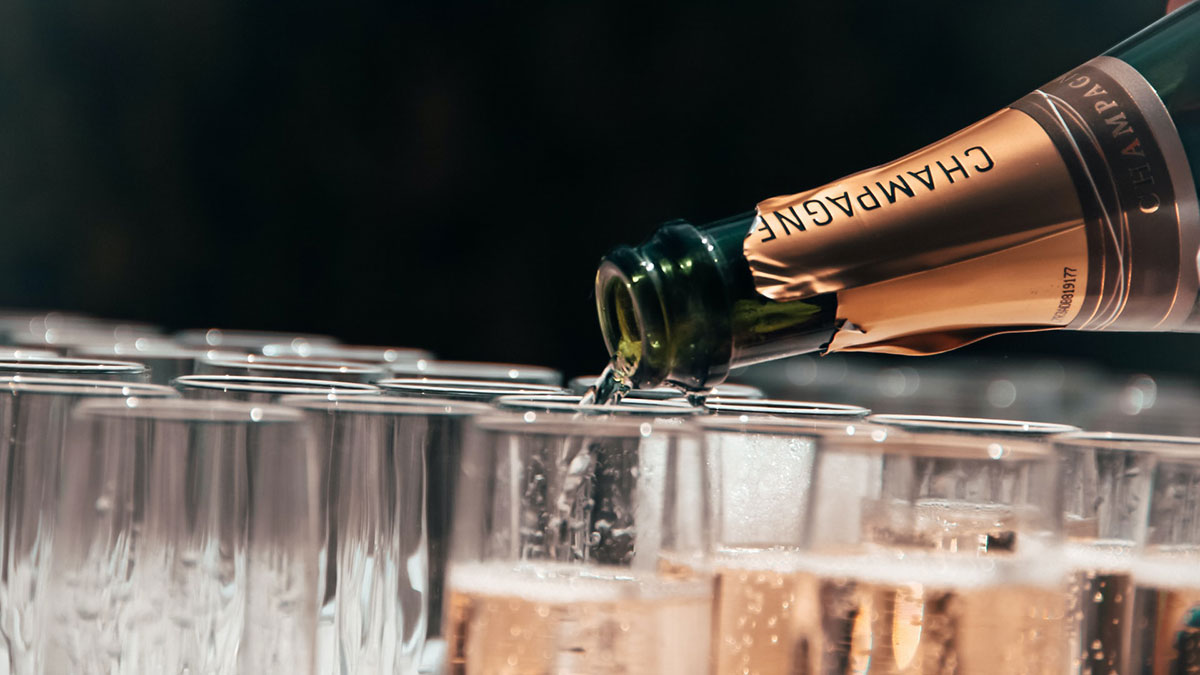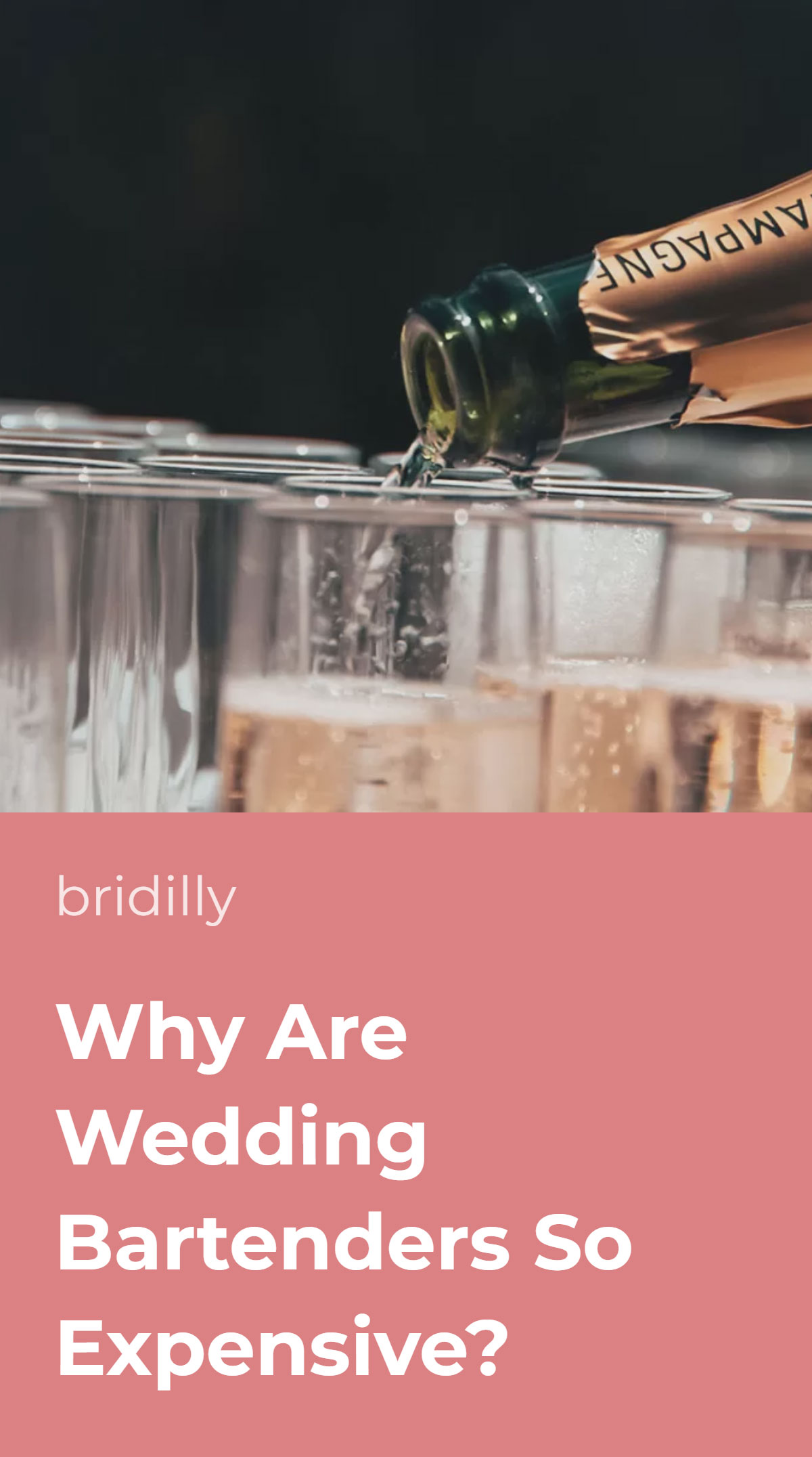An expensive wedding bartender isn’t mandatory for any event. But they can be of great help in creating the right atmosphere and keeping your guests entertained.
Some couples neglect professional wedding bartending services thinking their price isn’t justified, but it very much is.
Not any bartender from your local bar will be a good fit for a wedding. They must know how to behave at formal events and be able to support dialogue.
The bartender should also look appropriate for the occasion and have excellent attention to detail.
Bartenders working at private parties usually spend a lot of time, money, and effort on additional education and qualifications.
Your guests can make a regular whiskey with cola on their own, so hiring a bartender with basic knowledge doesn’t make much sense.
A wedding bartender’s hourly rate doesn’t include alcohol costs. So couples willing to impress guests with premium signature cocktails should be ready to pay accordingly.
Furthermore, a single bartender can’t handle orders of 200 guests. So you’ll likely have to hire multiple professionals if your guest list exceeds 50 people.
Work at weddings often involves travel, overtime, and weekend hours for a bartender.
Therefore, any extra work or time spent traveling should be paid for. It’s essential to keep this in mind when calculating your wedding bartending budget.
Table of Contents [show]
Education & Experience
Weddings are demanding when it comes to the quality of work. For example, you likely wouldn’t want to hire a bartender who has just finished their education and has zero work experience for your special day.
But broad knowledge and rich experience come with a hefty price tag.
A 40-hour bartending course costs $400 on average, but wedding bartenders typically don’t stop their professional development after finishing a short introductory course.
They must sign up for additional courses, for instance, to learn to make exquisite cocktails or understand the differences between wine types.
Each of such courses adds up another couple of hundred dollars, which should be compensated.
The supply and demand rule works with bartenders, too. An experienced professional is always in high demand, and finding one isn’t as easy. Consequently, they can charge higher hourly rates.
Wedding bartenders must learn not only to make beverages. In addition, they should study food safety and obtain the required certificates, which isn’t free either.
Customer Service
Any bartender’s work involves customer service. It starts with discussions with the couple. Answering questions and arranging tastings takes time and effort, even if you only contact the bartender over the phone or e-mail.
Furthermore, not every couple communicating with a bartender hires them afterward. This leads to lost time that could be spent on something more productive.
For the most part, of course, a bartender communicates with people during the event. Therefore, your chosen bartender should, at the very least, know the etiquette and, ideally, be a nice person.
Even better if they can crack a joke to reduce stress which isn’t uncommon at weddings.
While some bartenders may simply love to communicate with people, that’s only a part of the job for many. Their smile has a price tag.
Nearly no bartender will entertain your guests and consult them on which cocktail to choose for free.
Attention to Detail
A wedding isn’t a “hit or miss” type of event. You only have one chance to make everything right, so every detail should be flawless, including the bar.
In other words, weddings require a greater than usual attention to detail, which comes at an extra cost.
For instance, on a regular day, a bartender may wear a slightly crinkled shirt to work. But for a wedding, they should ensure that every element of their attire is perfect.
Indeed, bartenders are often asked to follow the wedding dress code to fit in and may have to purchase or rent new attire.
Attention to detail also includes the look of bartending equipment and cocktail decoration.
Your bartender may have to rent or purchase decorations and glassware that fit your wedding style better. That’s usually discussed in advance and is stated in an invoice.
Travel Expenses
It’s no secret that a bartender won’t travel to a wedding venue for free. You’ll need to either arrange a vehicle or to cover the travel expenses.
The expenses include not only fuel and driver’s wage. Travel also takes the bartender’s time, and typically, they charge the regular hourly rate for that.
The average hourly rate of a wedding bartender is about $40. So if your wedding venue is located three hours outside the city, expect to pay over $200 for a round trip. And this sum doesn’t even cover the vehicle expenses.
Sometimes, it’s easier to find a bartender closer to the venue than to make them travel, even if the venue is in the countryside.
The cost of liquors isn’t included in a bartender’s hourly rate. So, logically, the more luxurious alcohol you want to offer at your wedding, the higher the price will be.
Some couples only offer beer and wine at their weddings. There’s nothing wrong with having a limited selection of beverages, but a bartender isn’t needed in this case.
You can easily ask your relative or friend to handle drink serving and pay them twice less or make a buffet-type bar.
But if you hire a bartender who can make sophisticated cocktails, saving on ingredient quality isn’t wise. Even the best bartender won’t make cheap alcohol taste good.
However, you don’t have to get an open bar of premium liquors for your wedding.
Instead, some couples offer guests a limited selection of free alcohol and let the guests pay for premium options if they wish to. This way, your guests get the freedom of choice, and you don’t have to spend a fortune.
One or Multiple Bartenders
A single bartender may not be sufficient for a large wedding. Imagine a busy bar with only one bartender on a Friday night – the lines to get a drink can be endless. And you don’t want your wedding to be the same.
As a rule of thumb, hire one bartender for every 50 guests. With the average guest count at a wedding being 167, most couples will need at least three bartenders to handle the guest requests.
Hiring one bartender for a five-hour reception will cost you $200 on average. Hiring three will cost you $600.
Not only the bartender wage expenses increase depending on the number of guests. The more guests you invite, the more liquor you’ll need.
Offering an open bar at a 300-guest wedding can quickly drain all your savings, so think about it in advance.
The bartenders you hire may not have equally good skills.
Even if you are willing to pay for top-rated professionals, finding multiple experienced bartenders available on the same date may be complicated. In this case, you can even save money by diversifying their specialization.
Instead of hiring three bartenders skilled in every aspect, you may hire one knowledgeable in wines, another for cocktails, and the third for non-alcoholic beverages.
Hourly Rate
An hourly rate of a bartender for a private party can range anywhere between $15 and $300 an hour. This merely depends on the bartender’s experience and your geographical location. But how long should a wedding bartender work?
The average length of a wedding reception is four to five hours. Only hiring a bartender for two hours, even if it’s the best professional in your area, will result in guest disappointment.
It’s best to hire a cheaper professional for the entire reception.
To ensure that you can afford a wedding bartender, multiply their hourly rates by at least five. Don’t forget to add any time spent traveling and possible overtime.
Overtime
Weddings rarely end at the expected time. Numerous circumstances can extend the event duration, from the late arrival of the couple to the ceremony to lost rings or injuries of the guests.
But the bartenders (and other professionals you hire for the reception) make a schedule in advance. So they will arrive at the venue at the arranged time regardless of how late the reception begins.
And if you’ve paid for six hours, the bartenders will leave earlier, or you’ll have to pay for overtime.
Overtime may equal the bartender’s regular hourly rate, but it may also cost double. That’s because the bartenders must sacrifice other plans to keep your wedding going.
If a bartender has to travel to the venue, overtime will also affect the travel expenses. In addition, the vehicle driver will need to wait for the event to finish or to arrive later. Either way, this messes up their arrangements, too.
Sometimes, overtime may not be available. For example, the bartender may need to visit a different event. Therefore, it’s essential to discuss overtime options in advance.
Weekend & Night Work
Weddings are usually held at weekends, and that’s justifiable. You want your guests to have a good time and not worry about upcoming work. But weekend work often costs more.
One may argue that a bartender’s job implies weekend and night work. This makes sense, but even bars often pay extra for certain working hours.
For instance, a bartender may get $15 an hour working at a bar during the day but $20 working at night.













No Comments Add one
Leave a Comment